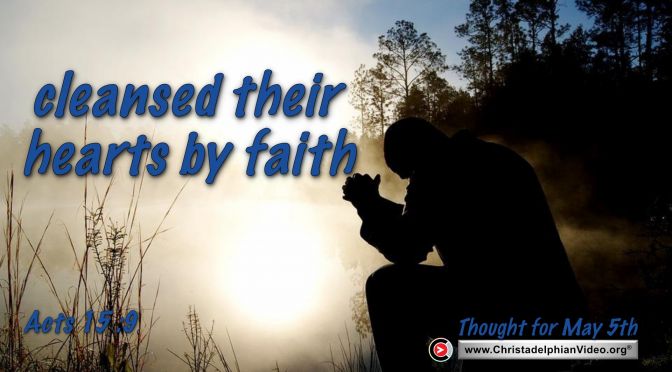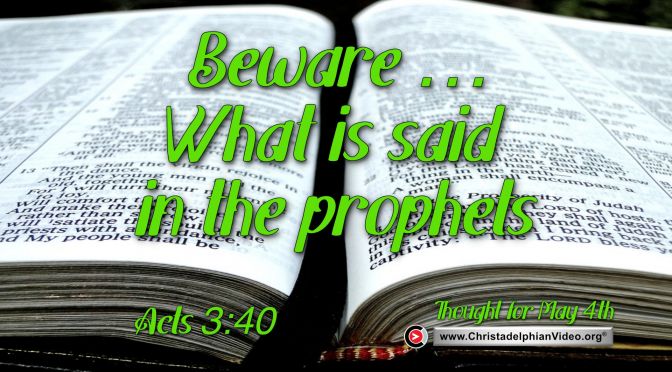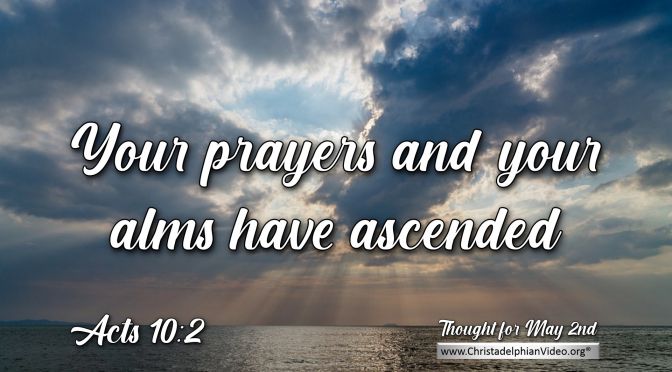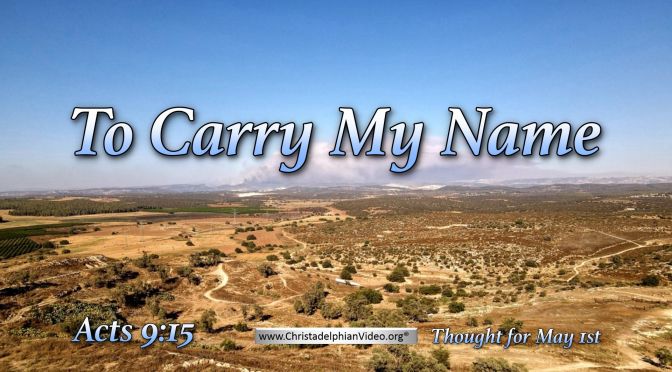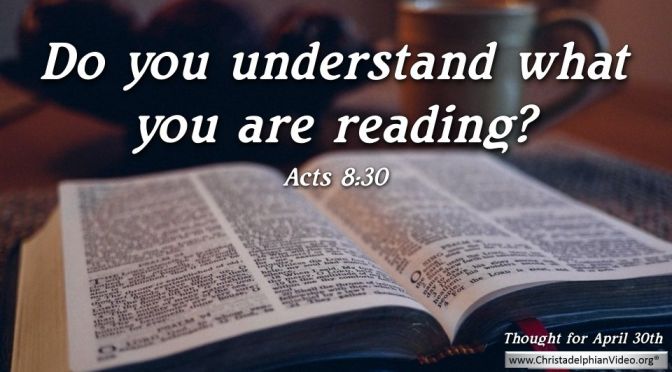It’s the Thought that counts “What does God Want? 25|4|2020”

The Following thought for the day was written by Brother Richard Morgan and provides insight and encouragement for those seeking to serve the God of Israel.
What is the point of life? In Ecclesiastes the Preacher asks that same question and the answer for those who live under the sun is not very encouraging: “I said in my heart with regard to the children of man that God is testing them that they may see that they themselves are but beasts. For what happens to the children of man and what happens to the beasts is the same; as one dies, so dies the other. They all have the same breath, and man has no advantage over the beasts, for all is vanity. All go to one place. All are from the dust, and to dust all return.” (Ecc. 3:18-20). Notice the echo here with the garden of Eden where God first put man to the test, found that he thinks just like the animals, and so will return to the dust of the ground. The Preacher seems to imply that our lives are just a repetition of that same Edenic test. If we were in the garden of Eden, we would do the same thing as Adam and Eve. Adam is us – the representative man.
Just a couple of verses before, in the same chapter in Ecclesiastes, the Preacher also says, “Moreover, I saw under the sun that in the place of justice, even there was wickedness, and in the place of righteousness, even there was wickedness.” (v.16). And that’s what we see in this world. Evil persists and has dominion over God’s creation. So, again we ask the question: what is the point of life?
In our other Old Testament reading for the day in Deuteronomy 8 we find out how God is dealing with this problem with our nature. There God explains why he brought his people into the wilderness – “And you shall remember the whole way that the Lord your God has led you these forty years in the wilderness, that he might humble you, testing you to know what was in your heart, whether you would keep his commandments or not.” (v.2). It was a “great and terrifying wilderness, with its fiery serpents and scorpions and thirsty ground where there was no water” (v.15), a good metaphor for the problems we encounter in our spiritual wilderness of life.
Let’s bring these two passages about testing together. On the one hand, the great experiment in the laboratory of life has confirmed that all sin and fall short of God’s glory. We see evidence of that everywhere we look, including in our own lives. But on the other hand, God is testing his people, in the same laboratory, and is looking for an entirely different outcome.
How we understand this conundrum is based on our understanding of the purpose of God. Many believe that God’s purpose is simply to save people. If that was the case, he hasn’t done a very good job of it. Even when he narrowed things down and concentrated just on the people he brought out of Egypt, everyone, except Joshua and Caleb, perished in the wilderness. That’s a dismal result. But God’s purpose isn’t just about saving people. If that was what it was all about, he could have created man without such a bias towards evil and saved a lot of people. But he created a world where evil rules and where we’re constantly confronted by the fiery serpents, scorpions and thirsty ground of a fallen world.
It’s only when we understand that God’s purpose is not only to fill this earth with his glory but to have a two-way relationship with his creation, that the problem of evil can be dealt with. Let’s think of some hypothetical scenarios, to help explain the type of relationship God is wanting to have with us. What if God created mankind without such a bent towards evil. Or what if he created man already perfect? Would either of those scenarios produce the intended result? The main problem with that is the impossibility of developing character in people who haven’t gone through the rigors of life. Let’s say God did create a people who were already perfect: what sort of character would they have? God, being omnipotent, could even have created people already with the right sort of character, but it wouldn’t be their own character, just something they were programmed with, and God isn’t looking for robots. What if God, in order to bypass an evil world, programmed those same people with a memory of character development so they think they’ve gone through the trials of living in an evil world, but it didn’t really happen. But then God would live for eternity with a people who were living out a charade, and surely that would bring the Creator no pleasure at all.
Whichever way we look at it evil is an absolute necessity. The all-wise God has surely created a world with exactly the right balance so that his people can be suitably tested and thus be the sort of people with a character that can spend eternity with him. Some of the people on the stage of life were created to bring evil into other people’s lives. That’s what Paul says in Romans about “vessels of wrath prepared for destruction” (Rom. 9:22). We look at a verse like that and think “that’s not fair on Pharaoh, or Hitler!”, or any of the other billions of people who end up having no part in the eternal purpose of God. So, what is fair? That God should save each and every person who has ever existed? If we take that idea of fairness to its logical conclusion then we should expect God to create an infinite amount of people and provide an infinite amount of grace to save every one of them.
But God’s purpose isn’t about salvation, it’s about building his family. Many people aren’t going to be part of that family and that’s OK. Take the hypothetical John Doe, for example, someone you meet who brings a trial into your life. He was created for the purpose of testing you so that through your interaction you develop a godly character. Without that interaction your character could not be developed, so John Doe was a necessity. But he will, as Ecclesiastes says, die just like the beasts which perish. Is that fair on John Doe? Well, think of it like this: did God have to create John Doe? What if he created Joe Bloggs for the purpose instead? Then John Doe would never have existed in the first place. Should we then feel sorry for John Doe because he never even existed? What about all the other infinite amounts of people God could have created but didn’t. Should we feel sorry for them as well? You can see how when we really think it through and try to question our Creator we run into these sorts of problems. Ultimately, we just don’t know for whom God has a plan, who he is working with and why someone was created
The lesson for us is to realize that God has created a world, an evil world, for the purpose of testing us, so that we might keep his commandments and develop godly characters. He wants to spend eternity with us, and he doesn’t want us to be robots or cardboard cutouts with no personality. He wants us to be people who have learned how to persevere and overcome. People who have chosen to serve him by following the example of his son and developing those hard to come by traits. All of that necessitates evil and trials in our mortal lives, We are going to have to endure through wildernesses and deal with temptation and mistreatment, sometimes at the hands of other people, but it’s all for the purpose of God working in our lives to bring us through as his purified sons and daughters.
Richard Morgan,
Simi Hills, CA
https://www.podbean.com/site/default/externalPodcastBadges
View all the thoughts in this series here…
https://bibletruthandprophecy.com/its-the-thought-that-counts-thought-for-the-day/


